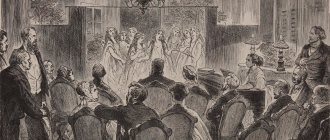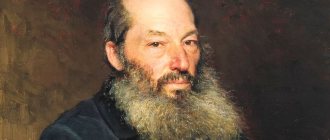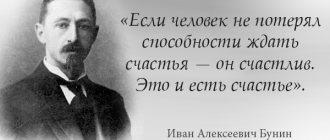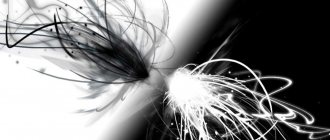Writers about I. S. Turgenev.
The verse reveals extraordinary poetic talent;
and true observation, deep thought snatched from the hiding place of Russian life, elegant and subtle irony, under which so much feeling is hidden - all this shows in the author, in addition to the gift of creativity, the son of our time, who carries in his chest all his sorrows and questions. V. G. Belinsky. About Turgenev’s poem Parasha. - “Notes of the Fatherland, 1843, No. 5. The higher your understanding of the meaning of Mr. Turgenev’s works, the truer it is and the closer it is to the opinion of every living person in the Russian public. N. G. Chernyshevsky. The conversation is partly literary, but no longer literary.
The singer of pure, ideal female love, Mr. Turgenev looks so deeply into another, virgin soul, embraces it so completely and with such inspired awe, with such heat of love, paints her best moments that /. / and our own heart swells and freezes from a languid feeling and blessed tears more than once come to our eyes. N. A. Dobrolyubov. When will the real day come?
This is a charming colossus, a gentle white-haired giant, he looks like the good old spirit of the mountains and forests, like a druid and like the monk himself from Romeo and Juliet. He is handsome with a kind of venerable beauty. E. and J. de Goncourt. Diary. 1863
If the English novel now has any manners and grace, then it owes this primarily to Turgenev. D. Galsworthy. Collection cit., vol. XVI, p. 399.
A sharp and subtle observer, precise to the smallest detail, he draws his heroes like a poet and painter. He is equally interested in both their passions and their facial features. / With great skill he paints the physical and moral side of phenomena, creating real pictures of reality, and not fantastic sketches. P. Merimo. Ivan Turgenev.
. a brilliant novelist who traveled all over the world, knew all the great people of his century, read everything that a person can read, and spoke all the languages of Europe as freely as his native one. Guy de Maupassant. Ivan Turgenev.
The enormous interest aroused by Turgenev’s works in Russia is largely due to the fact that they all touch on political issues, the fact that they, for all their artistic perfection and elegance of form, are distinguished by a pronounced propaganda orientation, and finally , because they pose burning questions of our time. John Reed.
I was raised on Turgenev. A. N. Tolstoy. Poly. collection cit., vol. XIII, p. 565.
We were the heirs of Turgenev's wonderful point of view on the common people. M. M. Prishvin.
Source
About Ivan Lazhechnikov
“... Mr. Lazhechnikov is no longer a young man, having been active in literature for more than thirty years...
Despite such a long period of time, despite the fact that during this period a lot of water has passed under the bridge, Mr. Lazhechnikov always remained true to himself, true to those pure and honest convictions that run through his entire literary activity. An ardent and receptive young man of the twenties, who depicted with enthusiastic colors the love of the fiery old man Volynsky for the gypsy Marioritsa, he became an ardent and receptive old man, with enthusiastic colors depicting his joy over various measures taken by the government for the good of the Fatherland.”
Statements about Turgenev and his work
TOP 10 quotes about Turgenev on the writer’s 200th anniversary.
1. Fyodor Dostoevsky
What a man! Poet, talent, aristocrat, handsome, rich, smart, educated, 25 years old - I don’t know what nature denied him? Finally: the character is inexhaustibly direct, beautiful, developed in a good school.
2. Mikhail Prishvin
We were the heirs of Turgenev's wonderful point of view on the common people.
3. Prosper Merimee
A sharp and subtle observer, precise to the smallest detail, he draws his heroes like a poet and painter.
4. Guy de Maupassant
5. Gustave Flaubert
You have been a master for me for a long time. But the more I study you, the more your talent amazes me. I admire the passion and at the same time restraint of your writing style, the sympathy with which you treat little people and which saturates the landscape with thought.
6. John Galsworthy
If the English novel now has any manners and grace, then it owes this primarily to Turgenev.
7. Leo Tolstoy
I keep thinking about Turgenev and love him terribly, I regret him and read everything. I still live with him. I will certainly either read it, or write it and let you read about it.
8. Vladimir Korolenko
Turgenev is one of our writers who knew how to descend into the very depths of everyday life in order to raise it with him.
9. Nikolay Nekrasov
He poured a whole sea of powerful, fragrant and charming poetry into this story (“Faust”) from his soul.
Without exaggeration, I will tell you that things (about the comedy “Where it is thin, there it breaks”) more graceful and artistic can hardly be found in contemporary Russian literature.
10. Nikolai Gogol
In all modern literature, Turgenev has the most talent.
When I am loved, I no longer need to endlessly think about myself. After all, I am confident in myself. I am free and can do something else.
Source
About Alexander Ostrovsky
Illustrations for fairy tales by M.E. Saltykova-Shchedrin
Illustrations for fairy tales by M.E. Saltykova-Shchedrin
Illustrations for fairy tales by M.E. Saltykova-Shchedrin
“Ostrovsky is such a lucky man. Only laurels and roses wrap around his brow, and since his brother became a minister, he himself has become more handsome. I stopped drinking kvass because it produces wind, and the courtiers go to see their brother...”
Statements of great people about I.S. Turgenev and his work
A. V. Druzhinin:
“In the circle of contemporary writers, there are persons superior to our author in talent, but in the subtlety and brilliance of his education, Mr. Turgenev has no rival among them. His works are full of thoughts, original views, reflections of the most diverse and varied theories that previously dominated literature and have not lost their significance to this day.”
(A.V. Druzhinin, “Tales and Stories of I.S. Turgenev”, 1857)
L. N. Tolstoy:
I. A. Goncharov:
". Turgenev, who created in “Notes of a Hunter” a number of living miniatures of serf life, of course, would not have given literature subtle, soft, full of classical simplicity and truly real truth essays of the small nobility, peasant people and inimitable landscapes of Russian nature, if he had not been saturated with love since childhood to the native soil of his fields and forests and did not retain in his soul the image of the suffering of the people inhabiting them!
(I. A. Goncharov, article “Better late than never,” 1879)
Turgenev Quotes
Prepared by: Dmitry Sirotkin
I present to you a selection of quotes from the writer Ivan Sergeevich Turgenev .
Interestingly, taken out of his works and letters, they acquire new, modern shades of meaning .
Quotes are divided into topics: life ethics, life, man, love, relationships, women and men, youth, happiness, about oneself, Motherland, Russians, Russian language, death, freedom, words, truth and lies, pride, laughter.
About life ethics
You must be able to belong to yourself - this is the whole point of life.
About great misfortune
“A great misfortune has befallen us, Granovsky. I can hardly muster the strength to write. We lost a man whom we loved, in whom we believed, who was our pride and hope... On June 24, in Novi, Stankevich died. I could, I should finish the letter here... What remains for me to say - why do you need my words now? Not for you, but more for me, I continue the letter: I became close to him in Rome; I saw him every day - and began to appreciate his bright mind, warm heart, all the charm of his soul... The shadow of imminent death lay over him even then. We often talked about death: he recognized it as the limit of thought and, it seemed to me, secretly shuddered. Death has a deep meaning if it emerges - as the last thing - from the heart of a full, developed life: to an old man - it is reconciliation; but for us, but for him - the dictates of fate. Should he die? He so deeply, so sincerely recognized and loved the holiness of life, despite his illness, he enjoyed the bliss of thinking, acting, loving: he was preparing to devote himself to the work necessary for Russia... The cold hand of death fell on his head, and the whole world perished.”
From a letter to Timofey Granovsky. July 4, 1840
Nikolai Stankevich timenote.info
For most readers of his time, Nikolai Stankevich remained a barely noticeable writer, the author of several works: he died of consumption when he was 26 years old. However, Stankevich made a strong impression on people who knew him personally. In the first half of the 1830s, while studying at the Moscow Imperial University, at that time the best educational institution in Russia, a small circle formed around him. Its participants discussed both eternal questions of the meaning of life and history, as well as their own psychological motivations and moods. The desire for self-improvement was considered the highest value. Turgenev was well acquainted with many of them, including Timofey Granovsky, a future professor and specialist in medieval Western European history. In Turgenev’s works, the circle was often portrayed as the cause of painful reflection that interferes with normal life, but he always considered Stankevich himself a model of moral purity and decency: it was he who became the prototype of Pokorsky from the novel “Rudin”.
if you want to write like Turgenev
How to write “Notes of a Hunter”: instructions
10 tips for Ivan Turgenev
About Apollo Maykov
“[Mr.] Maikov managed to construct a vaudeville-graceful picture even from such a matter, which least of all tolerates vaudeville grace. The story is not new, it is repeated many times with all the adaptations of French vaudevilles to Russian customs. The poet was obviously inspired by some French print with the caption: “La petite Nini faisant la lecture à sa mère” (“Little Nini reading aloud to her mother”) and decided to win the favor of the most respectable public by depicting this print in verse and transposing it into Russian morals."
“Genius of Measure”: Turgenev in Russian culture
The definition of “genius of measure”, belonging to D. Merezhkovsky, was heard in the following context: “In Russia, the country of all kinds of revolutionary and religious maximalism, the country of self-immolations, the country of the most frantic excesses, Turgenev is perhaps the only one, after Pushkin, a genius of measure and, hence the genius of culture. For what is culture if not the measurement, accumulation and preservation of values? In this sense, Turgenev, in contrast to the great creators and destroyers L. Tolstoy and Dostoevsky, is our only guardian, a conservative and, like any true conservative, at the same time a liberal.”
Merezhkovsky's formula reflects all aspects of I. Turgenev's personality and creativity. Let’s try to expand it, identifying those parameters-directions that allow us not only to see Turgenev’s “dimensionality”, but also to realize its exceptional significance in Russian culture and literature.
Versatile and at the same time deep education, a unique artistic gift, a large-scale personality, intellectual power, social intuition, educational energy with the assistance of fate, which determined the writer’s primary place of residence in Western Europe - all this provided Turgenev with a special - middle, pivotal - place in the cultural life of the era .
He was a connecting link, a center of attraction and a point of repulsion, an object of admiration and an object of envy, an inspirer and an irritant, a master of thoughts and an irreconcilable opponent of numerous great and ordinary contemporaries in Russia, Europe and even America. The most fashionable, most widely read writer of his time, he was at the same time a great artist who paved his own path not only in Russian, but also in world literature - a unique combination, because “fashionable”, as a rule, is not the pinnacle, not perfect, and averagely attractive, “surrogate” and therefore in demand by the majority, in this case “fashionable” - at the same time elitist, refined, unattainably perfect.
The feeling of the elusive and at the same time undoubted standard of Turgenev’s writing was formulated in 1874, after reading the story “Living Relics,” by George Sand: “Tous nous devons aller a l’école chez vous”: “We must all go to you for training.” . Chekhov’s hero speaks about the same thing, but with a different, irritable, tone on behalf of his fellow writers: “And so until the gravestone everything will be only sweet and talented, sweet and talented - nothing more, and when I die, my acquaintances, passing by the grave, they will say: “Here lies Trigorin. He was a good writer, but he wrote worse than Turgenev."
It was really tricky to write better than Turgenev, especially since the apparent simplicity, skillful artlessness of the writing in this case had its reverse side in depth, complexity, multidimensionality of meanings, on the surface of the text indicated by dotted lines, openwork allusions, associations, parallels, omissions - that is why Turgenev , for all his textbook significance, still remains partly unread or superficially read, and most importantly, an underestimated artist. Apparently, he himself contributed to the latter circumstance to some extent.
In 1856, even before his famous novels, in a letter to S. Aksakov, Turgenev explained: “I am one of the writers of the interregnum - the era between Gogol and the future leader; we all developed in breadth and dispersion what a great talent would have compressed into one strong whole, extracted by him from the depths; What to do! So judge us” (3, 32). The same idea was almost simultaneously expressed in a letter to L. Tolstoy: “... I am a writer of a transitional time - and I am only suitable for people in a transitional state” (3, 43). After two decades, at the peak of not only Russian but also world fame, read and revered in Europe and the USA, who became the plenipotentiary representative of Russian literature in the West and an active promoter of Western European literature in Russia, Turgenev writes to his American correspondent, philosopher and theologian Henry James : “Your letter is too flattering for me, dear sir. I am, of course, happy that I have such supportive readers in America and am proud of your kind attitude towards me; but you overestimate me. Modesty is a touchy thing; people do not believe in her sincerity, and they are generally right: I hope that it is not modesty, but an accurate assessment of my abilities that tells me that I am not ejusdem farinae, like Dickens, J. Sand or J. Eliot. I am quite content with second or even third place after these truly great writers” (10, 446). Unfortunately, Russian literary criticism, represented by many of its representatives, turned out to be too “obedient” in relation to such self-assessments and, in different contexts and on different occasions, repeated as an objective fact the idea of the secondary, transitional quality of Turgenev’s creativity. Meanwhile, in this case there is no need to talk about secondary nature at all, because Turgenev “went <...> from a side from which no one had ever come before him <...>”, not only to the people, as V. Belinsky, but also to life, to man in general, having created a unique artistic world - it is noteworthy that he did not have and still does not have direct literary successors or even imitators, because it turned out to be extremely difficult for him to inherit and impossible to imitate. As for transitivity, perhaps it really exists both in creativity and in fate - but transitionality not as insufficiency, underexpression, incompleteness, but, on the contrary, as that degree of completeness that absorbs the diversity and complexity of being, which is inherent in regularity, balance, attention to different aspects of life and different, including opposing, opposing ideological intentions.
Turgenev's artistic strategy can be metaphorically defined as building bridges - establishing deep essential connections between disparate and even antagonistic phenomena and meanings, recreating them without deliberate distortions, tendentious shifts and distorting proportions of exaggeration or derogation.
In “Notes of a Hunter” there is a hero in whom, more clearly than in other Turgenev characters, the author himself is imprinted precisely as the bearer and embodiment of measure, as the personification of the connecting principle - this is the Narrator, the hunter, who represents both involvement and distance, goodwill and intransigence , attention, scrupulousness, meticulousness and - artistry - unostentatious, discreet, but undoubted and unchanging artistry in relation to life, no matter how ordinary and unpretentious it may be; in the perception and with the participation of the Storyteller, the most ordinary pictures acquire poetic appeal and depth. A hunter of elusive “game” that is nothing but art—fluid flesh and the shimmering meanings of existence, a wanderer by his mental make-up and by the plot task assigned to him, the Narrator is given in continuous movement from one story-situation to another, at the intersection of human destinies. worlds, which, thanks to him, together form a voluminous, multifaceted, multifaceted and multicolored picture of national life, representing a single - with all its internal diversity, complexity and diversity - national world. Already contemporaries felt that “Notes of a Hunter” is a kind of “anti-Gogol”: living souls. Other contemporaries and descendants, especially Soviet ones, strongly emphasized the social, protest meaning of the book - and it undoubtedly has it, but it is balanced by many other meanings, and in general, “Notes of a Hunter” is a book that has no analogues in Russian classical literature on the persuasiveness, accuracy, scale and organicity of penetration into the deep national world in its natural, everyday state, without criminal, ideological, sacred and other accentuations, which were invariably brought to this topic by Turgenev’s great contemporaries.
In Dostoevsky’s “Crime and Punishment” there is an extremely remarkable statement by investigator Porfiry Petrovich about a “noble” criminal who was released, addressed to this criminal himself, that is, Rodion Romanovich, and addressed: “And where can he run away, hehe! <…> Will he escape into the depths of the fatherland, or what? But there are men living there, real, old-time Russians; So, after all, a modern, developed Russian person would rather live in prison than live with foreigners like our peasants, heh heh!” And the action of “Notes of a Hunter” - like, by the way, most of Turgenev’s novels - is exactly where it takes place: in the depths of the fatherland, where real, old-time Russian men live, who were not “foreigners” either for the Narrator or for Turgenev standing behind him. Dostoevsky perceived deep Russia through prison - it is enough to re-read the inserted short story “Notes from the House of the Dead”, “Akul’s Husband” to see: everyday peasant life appeared in his mind’s eye even more monstrous than convict life - this is not his fault, but a misfortune, and Ultimately, personal tragedy turned into grandiose artistic achievements in his case, but he composed the “god-bearing peasant” precisely in contrast to his experience, in atonement for his own involuntary guilt before the people - his inescapable foreignness to them, captured with merciless precision in the same “Notes from House of the Dead" and echoed not only in the above fragment of "Crime and Punishment", but also in many other artistic images and journalistic statements.
Unlike Dostoevsky, Tolstoy, like Turgenev, and much longer than Turgenev, lived in the depths of Russia, next to the peasants, together with them, but, with a brilliant gift for painting existing things, he had an urgent need to endow this existing with conceptual meanings, systematize, organize and logicize living life, which caused categorical rejection and serious fears from Turgenev, about which he repeatedly writes to A. Fet - for example, in a letter dated September 6 (18), 1871: “I am very glad that Tolstoy is better and that he speaks Greek so overcome - it does him great honor and will bring him great benefit. But why is he talking about the need to create some kind of special Russian language!! - create the sea. It spread all around in boundless and bottomless waves; It’s our job as writers to direct some of these waves into our channel, to our mill. And Tolstoy knows how to do this. That’s why his phrase only bothers me as much as it shows that he still wants to split hairs” (9, 133).
Turgenev never had this desire to “create a sea”, the need to “be wise” - he succeeded in something else: in the ability to direct the vast and bottomless Russian life (as well as the truthful and free Russian language) into his own artistic direction, without giving it “wise ”, that is, artificial, tendentious shades. Is this why Tolstoy himself, rereading Turgenev and thinking a lot about him after his death, emphasized in a letter to A. Pypin: “The main thing in him is his truthfulness.” Further, developing the theme, Tolstoy writes: “Turgenev is a wonderful person (not very deep, very weak, but a kind, good person), who always says well the very thing, what he thinks and feels <...> the influence of Turgenev there was the best and most fruitful response to our literature. He lived, searched, and expressed in his works what he found—everything he found. He did not use his talent (the ability to portray well) to hide his soul, as they did and do, but to turn it all out. He had nothing to fear." With all the respect of Tolstoy’s assessment, there is also a certain condescending shade in it, which reduces the trend: Turgenev’s truthfulness, according to the logic of the letter, lies in the fact that he was honest about himself: he did not dissemble, did not lie, that he “found” - that and wrote, he was not afraid to “turn out” his soul, but he was “not a very deep” person, which means that he did not find everything. In the memoirs of G. Danilevsky, a similar Tolstoy review of Turgenev is captured: “He was an independent, inquisitive mind until the end of his life <...> And I, despite our once fleeting disagreement, always highly respected him and loved him dearly. He was a true, independent artist who did not stoop to consciously serving the fleeting needs of the moment. He could have been mistaken, but his very mistakes were sincere.”
However, what seemed to Tolstoy to be a delusion was simply another rightness - moreover, it could well have been objective (as far as this is possible) rightness. As Y. Nikolsky wrote regarding Dostoevsky’s reproaches that Turgenev, living outside Russia, “does not know the facts,” does not know “Russian life in general,” “Turgenev knew other facts. Turgenev had a worldview that was completely opposite to Dostoevsky, and other facts were added to it.”
As for the very significant reservation - “not a very deep” person - this assessment, due to the completely legitimate subjectivity of Tolstoy, has taken root in many literary works, and in the recently published book of V. Skvoznikov we read: “No matter how much you inspire the modern reader (and sometimes to myself), that this is a living classic, that the prose is “fragrant,” and so on. - all the same, Turgenev looks, if not cutesy (like Karamzinov), then simple-minded,” - so you won’t be able to ignore it, you need to either agree or refute it, explaining its source, the reason for its appearance.
Let us assume and, to the best of our ability, prove it below that what some of Turgenev’s readers seemed and continues to seem like “shallowness” is essentially proportionality, balance, harmony - both aesthetic and ideological. Turgenev himself explains this indirectly in his letters, in particular and above all in his statements about Tolstoy. One of them - about language - is given above, but here is another, also from a letter to Fet: “Whatever he does, it will be good if he himself does not distort the work of his hands. Philosophy, which he hates, took revenge on him in an original way: it infected him himself - and our enemy of reasoning began to reason recklessly! Perhaps all this has now slipped away from him - and only the pure and powerful artist remains!” (9, 170). The didactic intention in Tolstoy’s work worsened by the 80s, that is, by the time to which his statements about Turgenev belong, so it is possible that Tolstoy in Turgenev lacked that “depth” that, from the point of view of Turgenev himself, was “ reasoning" and against which he actively and consistently protested, defending the "pure and powerful artist" from completely unnecessary, from his point of view, layers alien to art. To the “early” Tolstoy, in whom a great artist was immediately evident and at the same time a “teacher” emerged from the very beginning, Turgenev, who closely and interestedly watched his development, wrote: “You become free, free from your own views and prejudices. Looking to the left is as pleasant as looking to the right - nothing is in sync - there are “prospects” everywhere <...> - you just have to open your eyes. May God grant that your horizons expand every day! Systems are valued only by those who are not given the whole truth into their hands, who want to catch it by the tail; the system is exactly the tail of truth, but truth is like a lizard: it will leave its tail in its hand and run away: it knows that it will soon grow another one” (3, 75). Of course, from the point of view of the “orthodox”, such openness to different perspectives, such flexibility and - let’s use here a word that usually belongs to a different context, but is extremely appropriate in relation to Turgenev - such responsiveness can be perceived as superficiality, “shallowness” and ideological “lack of integrity” " However, from another point of view, with a different approach, not biased, not limited by the framework of the only true teaching, openness to truth in its various manifestations reveals greater depth than the reduction of truth to one immutable option, and ideological skepticism turns out to be the basis for the integrity of a different, more complex quality and order than one that is filled with one-directional pathos.
Unlike most of his fellow writers, Turgenev received a very serious philosophical education, but already in the process of receiving it, in his youth, being in the very crucible of world philosophy, in Germany, he differed from his fanatically worshiping Hegel and his teaching comrades in his coolness and restraint in relation to ideological shrines, distance from endless speculative vigils and debates. As B. Zaitsev writes, “doctrinaireism and the spirit of teaching repelled him from circles.” And in this regard, he remained true to himself all his life: he did not create any “teaching”, no “system”, did not ornate, did not prophesy, did not teach, but realized himself in “pure” art, dissolving philosophy in the text, not trusting it with direct , especially the final, “reasoning” word, because he did not recognize the finality and absoluteness of the speculative system, no matter how harmonious and convincing within itself it may be. “Idols were hateful to his scientific and philosophical mind,” and in this freedom from any dogma was his, Turgenev’s, depth and integrity. For Turgenev, art became the realm of that highest freedom, the image-symbol of which is hunting in “Notes of a Hunter.” In the final story of the cycle, “Forest and Steppe,” there are the following lines: “Hunting with a gun and a dog is beautiful in itself, ftr sich, as they used to say in the old days; but suppose you were not born a hunter: you still love nature; you, therefore, cannot help but envy our brother...” In the autographs, after the words “you still love nature,” there was “and freedom.” In the drafts of an unfinished article about hunting, Turgenev wrote: “I love hunting for freedom.”
Among M. Gershenzon’s insightful observations on the principles of depicting peasant heroes in “Notes of a Hunter” is the following: “It is good that Turgenev did not give them all in plots, like animals in cages, but showed them in a free state.” The writer’s novel strategy can also be characterized.
Actually, the novel in Turgenev’s work begins with the fact that the hero - Dmitry Rudin - breaks out of the boundaries of the plot rut (“cage”) initially intended by the author, if not completely overturning, then significantly correcting the unambiguous, “systemic” data given to him in the main plot characteristics. Moreover, in “Rudin” the liberation of the hero, the complication of his image, the introduction of ambiguity and fundamental understatement into his character is carried out at the cost of violating the laws of artistic harmony, with the help of the inevitable exposure of plot and compositional seams: after the story is almost completed and the hero, having suffered a complete fiasco, leaves the Lasunsky estate, two additions follow: the twelfth chapter, which takes place two years after the main events and is essentially similar to the epilogue, and the epilogue itself, which captures the event that occurred after several more years. In these two “added” fragments, contrary to usual, what was said earlier is not summarized, but rather re-evaluated, the characteristics given in the main plot are significantly corrected, the verdict passed on the hero is refuted, as a result of which the figure of Rudin receives a new light, his personality and his fate are presented under a fundamentally different angle of view. The hero, who, not without reason, was charged with the desire to pin down with a word, like a butterfly with a pin, any phenomenon, feeling, thought, escapes from such pinning, which actually happened to him within the framework of the conventional first part of the novel, and the meaningful watershed turns out to be his own a word about himself - a letter to Natalya Lasunskaya, in which he acknowledges the justice of all the reproaches addressed to him, but both the very fact of this recognition and the significant clarifications made along the way cast doubt on the unconditionality of the verdict. “An unfinished being,” as Rudin himself calls himself in a letter, reveals an intractability to be measured by other people’s categorical assessments and methods of psychological analytism, which inevitably fix a certain instantaneous certainty - this very analytism here is possible only in the questioner (from within the hero to himself and from the outside to him ) - option. And this, in turn, determines the form of the novel. Having convincingly shown the philosophizing hero-idealist and no less convincingly leading him to defeat on a love date, which at the same time certainly turns out to be a defeat for the theorist in the field of life, the author himself seems to stumble over this linear, unidirectional evidence and, to the detriment of artistic harmony, but in the name of artistic truth , where the point should have been made, suddenly starts talking from the other end, as a result of which the previously cited arguments are balanced by counterarguments, and in the aggregate, all this together forms an artistic field in which there are areas of certainty containing different, including contradictory certification, and there are “dark” places, omissions, reticences that leave the “unfinished being” the right to incomplete assessments, that is, the right to freedom, including freedom of interaction with the reader.
In other words, Turgenev, experimentally, in the very process of writing his first novel, imprinted in its imperfect structure, finds a novel measure for setting up the hero, in which the hero, on the one hand, is revealed and presented in many ways, and on the other hand, preserves the secret of his face and personal integrity. It is the mystery of the face that turns out to be the ideological and artistic center of Turgenev’s novel.
“Well, what exactly is Mr. Bazarov himself?” - Pavel Petrovich asks his nephew and at the same time sets the plot logic and the main intrigue of “Fathers and Sons”. One can, of course, be content with Arkady’s answer: a nihilist, one can take into account subsequent deciphering of this concept, and the indignant certifications of Pavel Petrovich, however, throughout the entire novel, from the beginning, from the very moment of the appearance of a tall man in a long robe with tassels, who immediately gave his hand to Nikolai Petrovich, and until the farewell lines about Bazarov’s grave, about eternal reconciliation and about endless life, we almost continuously follow the hero, in every remark, in every silence, gesture, action, plot twist, looking for the answer to the question that he this, and without receiving a final, unequivocally categorical answer.
Why didn’t Bazarov immediately shake hands with Nikolai Petrovich when they met? Badly brought up? “Proud, impudent, cynic, plebeian”? Or maybe because he foresaw what happened a little later in the living room of the Kirsanovs’ house, when Pavel Petrovich not only did not extend his hand to him, but pointedly hid it in his pocket? And what does this delayed gesture mean - just bad manners? plebeian self-inflation? or maybe vulnerability and even complexness hidden behind indifference and rudeness? Why, after the appearance of Kirsanov Sr., does Bazarov rush after Arkady, while before that he had no intention of leaving the living room and sat comfortably on the sofa, from which he “suddenly breaks away” now? Doesn't want to stay in the company of the Kirsanov brothers? feels awkward? confused? that is, from the very beginning he is not as unambiguously self-confident as he wants to appear and seems to others? These are just a few “little things” that give a quick and superficial idea of what voluminous and complex artistic flesh Turgenev’s hero and the novel as a whole are created from.
Researchers who reproach Turgenev for being “simple-minded”, taking his characters out of their social roles and functions (many people, including L. Ginzburg and G. Byaly, were guilty of this), trust too much the straightforward word of the novel that lies on the surface and underestimate the rich novel context and subtext, that very “system of connections” that Tolstoy wrote about and outside of which, removed from it, nuances and details are “lowered,” flattened and killed, and with them the entire image. Much more insightful than many professionals regarding Turgenev was the critic N. Mikhailovsky, who, not without irritation, wrote: “He [Turgenev] loves <...> lace work:
- Merezhkovsky D.S. Tolstoy and Dostoevsky. Eternal companions. M.: Republic, 1995. P. 475.[]
- Turgenev I. S. Complete. collection Op. and letters in 28 vols. Letters in 13 vols. M.-L.: Publishing house. USSR Academy of Sciences, 1961-1967. Here and below, letters are quoted indicating the volume and page in the text of the article.[]
- From the same dough (lat.). []
- See the works of V. Kirpotin, V. Odinokov, V. Kozhinov, L. Ginzburg and others[]
- Belinsky V. G. A look at Russian literature of 1847 // Belinsky V. G. Collection. Op. in 9 vols. T. 8. M.: Fiction, 1982. P. 400.[]
- Tolstoy L.N. Complete. collection Op. Reprint reproduction of the 1928-1958 edition. T. 63. M.: TERRA-TERRA, 1992. P. 149-150.[]
- L.N. Tolstoy in the memoirs of his contemporaries. In 2 vols. T. 1. M.: Fiction, 1978. P. 350-351.[]
- Nikolsky Yu. Turgenev and Dostoevsky (The story of a feud). Sofia, 1921. P. 41.[]
- Skvoznikov V.D. Pushkin tradition. M.: IMAP RAS, 2007. P. 130.[]
- See, for example: Zenkovsky V.V. Worldview of I.S. Turgenev // Zenkovsky V.V. Russian thinkers and Europe. M., 1997.[]
- Zaitsev B.K. Distant. M.: Soviet writer, 1991. P. 157-158.[]
- Nikolsky Yu. Decree. Op. P. 84.[]
- Turgenev I. S. Collection. Op. in 12 vols. T. 1. M.: Fiction, 1975. P. 391.[]
- Gershenzon M. Turgenev’s dream and thought. M., 1919. P. 70.[]
Want to continue reading? Subscribe for full access to the archive.
Get access
Already subscribed? Log in to access the full text.
About Alexei Tolstoy’s novel “Prince Silver”
“The first chapter begins with the twenty-five-year-old Prince Nikita Romanovich Serebryany, returning from Lithuania, where he was sent by Tsar Ivan Vasilyevich to sign peace, approaching the village of Medvedevka, thirty miles from Moscow. Good start! The talented count describes his hero as simple-minded, quick-tempered, truthful and having an appearance corresponding to these qualities. This appearance is simple-hearted and frank; He is of medium height, broad at the shoulders, thin at the waist. In general, this description could be called masterful if some inconsistency had not crept into it, namely, on page 12 there is an indication of a certain oblique fold located between the eyebrows and meaning, in the opinion of the author (very witty), disorder and inconsistency in thoughts, and after this it is said that the hero’s mouth expressed unshakable firmness. It follows from this that the mouth, in combination with the fold, expressed an inconsistent and disorderly hardness, or a solid disorderliness, which, of course, was not included in the writer’s calculations; but everything else in this chapter is excellent.”









